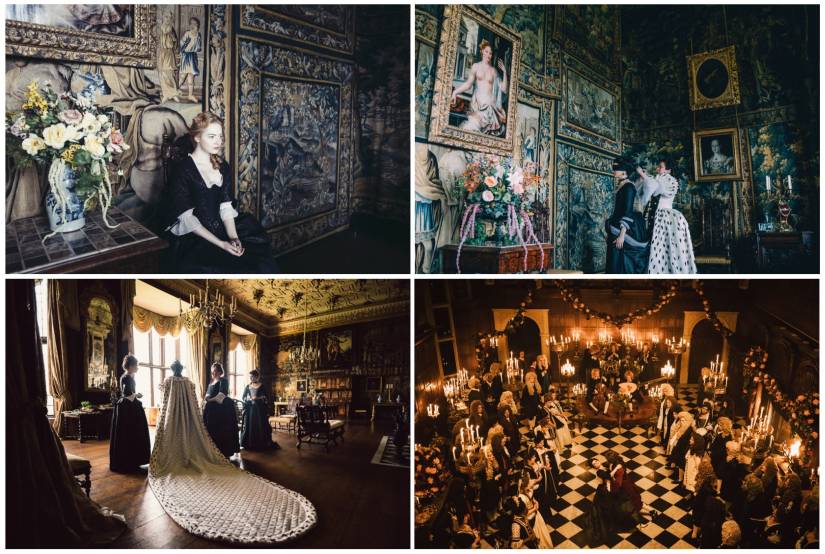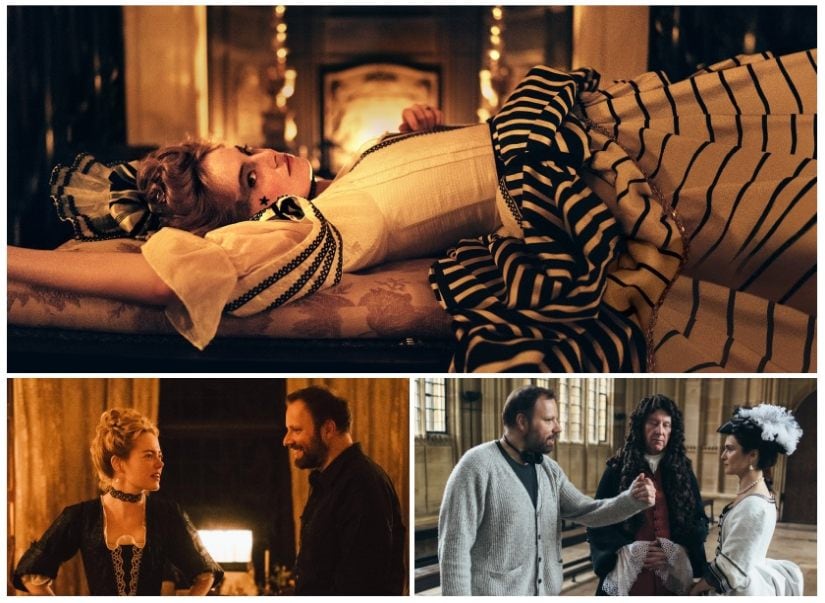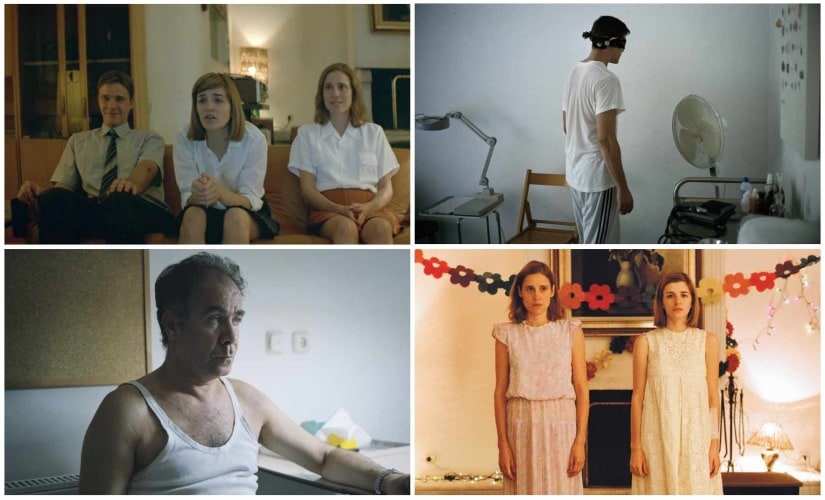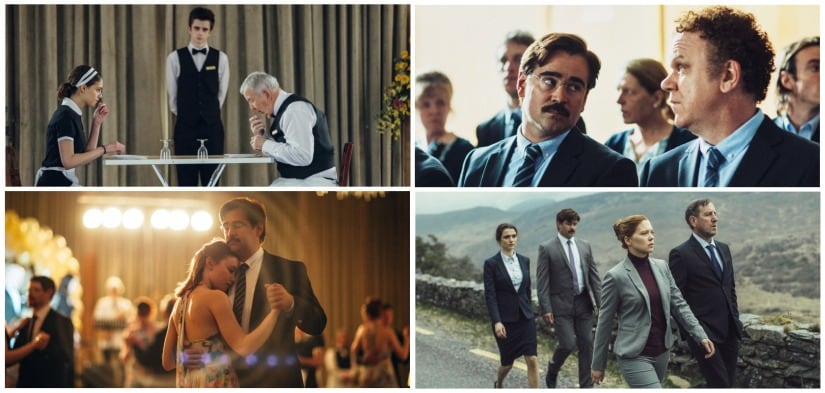When you think of costume dramas, you imagine men in large wigs and excessive makeup, and women in fancy hats and uncomfortable corsets, making genteel small talk about the weather while sipping tea in their dainty little cups (Blame the BBC, Jane Austen and Keira Knightley). But filtered through Yorgos Lanthimos’s high-concept madness, satirical impulses and playful irreverence, The Favourite turns into a revisionist masterpiece full of self-reflexive absurdities. [caption id=“attachment_6136891” align=“alignnone” width=“825”] In The Favourite, Yorgos Lanthimos sets the stage for a deliriously fun acting showcase for its three exceptionally talented female leads: Olivia Colman (top), Emma Stone (left) and Rachel Weisz (right). Fox Searchlight[/caption] The Greek auteur/provocateur’s Oscar-nominated film, The Favourite, may be more straightforward in its narrative and more formal in its setting than his previous films but he doesn’t really abandon his penchant for the absurd. By choosing a premise ripe for zany subversion, Lanthimos devises one of the most curious experiments with a hitherto clear-cut genre. Turning 18th century Kensington Palace into a psychological and political battlefield, The Favourite dramatises the triangular struggle for dominance between the petulant and needy Queen Anne (Olivia Colman) and her two court favourites — childhood best friend Sarah Churchill (Rachel Weisz) and Sarah’s ambitious younger cousin, Abigail Masham (Emma Stone) — sparring and scheming to win her affection. Though it is a reconstruction of a mostly overlooked and gloriously decadent period of British history, Lanthimos and screenwriters Tony McNamara and Debora Davis don’t concern themselves too much with historical accuracy. They are more interested in the sexually-charged power plays and how Sarah and Abigail transcended early 1700s gender roles to work their way into the Queen’s good graces — and her bed — in order to gain aristocratic standing. [caption id=“attachment_6136901” align=“alignnone” width=“825”]
 Various stills showcasing the gorgeous and elaborate set design for The Favourite. Fox Searchlight[/caption] In fact, Lanthimos favours anachronism (in dialogue and dance) over accuracy, turning this lesson in history into a wicked tour de farce. After all, any historical drama is bound to suffer from some embellishments and oversights, so he would rather emphasise the story’s modern-day relevance. Taking away the glitter and glamour of your typical royal period drama, he uncovers a sordid and scandalous underbelly that is more in line with our present tabloid-fuelled royal (read: Meghan Markle) obsession. Lanthimos piles on the absurdist fun with his DoP Robbie Ryan as they indulge in stylistic unorthodoxy. The striking visual flourishes, and artfully-composed frames capture the beauty of the set’s high-ceiling-ed, lavish interiors — the scene of desire, debauchery and deception — down to the most insignificant details. The use of fish-eye lenses and extremely high and low-angle shots play a spatial and psychological role. The resultant warped compositions make the rooms seem bigger and emptier, emphasising the characters’ sense of alienation. An unflattering close-up shot then betrays their underlying emotional turmoil. All this sets the stage for a deliriously fun acting showcase for its three exceptionally talented female leads in Colman, Weisz and Stone. [caption id=“attachment_6136861” align=“alignnone” width=“825”]
Various stills showcasing the gorgeous and elaborate set design for The Favourite. Fox Searchlight[/caption] In fact, Lanthimos favours anachronism (in dialogue and dance) over accuracy, turning this lesson in history into a wicked tour de farce. After all, any historical drama is bound to suffer from some embellishments and oversights, so he would rather emphasise the story’s modern-day relevance. Taking away the glitter and glamour of your typical royal period drama, he uncovers a sordid and scandalous underbelly that is more in line with our present tabloid-fuelled royal (read: Meghan Markle) obsession. Lanthimos piles on the absurdist fun with his DoP Robbie Ryan as they indulge in stylistic unorthodoxy. The striking visual flourishes, and artfully-composed frames capture the beauty of the set’s high-ceiling-ed, lavish interiors — the scene of desire, debauchery and deception — down to the most insignificant details. The use of fish-eye lenses and extremely high and low-angle shots play a spatial and psychological role. The resultant warped compositions make the rooms seem bigger and emptier, emphasising the characters’ sense of alienation. An unflattering close-up shot then betrays their underlying emotional turmoil. All this sets the stage for a deliriously fun acting showcase for its three exceptionally talented female leads in Colman, Weisz and Stone. [caption id=“attachment_6136861” align=“alignnone” width=“825”] (Top) Emma Stone as Abigail Masham in The Favourite; Yorgos Lanthimos directs Stone (L) and Rachel Weisz (R) on set. Fox Searchlight[/caption] Going by the enthusiastic reception and multiple Oscar nominations, it looks like The Favourite could finally win Lanthimos a sizeable mainstream audience. Its relatively more accessible narrative does make it the ideal gateway film to the Lanthimosian cosmos of deadpan absurdism and cynical parables. The Greek filmmaker has made a noteworthy career by drawing out sado-giggles from moments of painful irony intrinsic to life’s absurdities. His cinema is essentially an absurd reaction to our absurd reality. So, there’s plenty to laugh at despite the dark subject matter because there’s intelligence and insight behind the comedy. Before The Favourite, many of Lanthimos’s bizarre plots were conceived in collaboration with fellow Greek screenwriter Efthymis Filippou, starting with his breakthrough feature, Dogtooth (2009). Arguably his bleakest film till date, the 2009 Un Certain Regard winner was a chilling study of isolationism and oppression as three young adults are confined to a remote country estate and quarantined from all exterior stimuli by their over-protective parents. Through home-grown propaganda, they are led to believe that small yellow flowers are called zombies; airplanes are small toys flying overhead; stray kittens are humanity’s biggest existential threats; and incest is a recreational activity. Lanthimos’ seemingly surreal tale of parental autocracy acts a shocking parable about how a totalitarian society controls its citizens through deliberate misinformation and language distortion. [caption id=“attachment_6137021” align=“alignnone” width=“825”]
(Top) Emma Stone as Abigail Masham in The Favourite; Yorgos Lanthimos directs Stone (L) and Rachel Weisz (R) on set. Fox Searchlight[/caption] Going by the enthusiastic reception and multiple Oscar nominations, it looks like The Favourite could finally win Lanthimos a sizeable mainstream audience. Its relatively more accessible narrative does make it the ideal gateway film to the Lanthimosian cosmos of deadpan absurdism and cynical parables. The Greek filmmaker has made a noteworthy career by drawing out sado-giggles from moments of painful irony intrinsic to life’s absurdities. His cinema is essentially an absurd reaction to our absurd reality. So, there’s plenty to laugh at despite the dark subject matter because there’s intelligence and insight behind the comedy. Before The Favourite, many of Lanthimos’s bizarre plots were conceived in collaboration with fellow Greek screenwriter Efthymis Filippou, starting with his breakthrough feature, Dogtooth (2009). Arguably his bleakest film till date, the 2009 Un Certain Regard winner was a chilling study of isolationism and oppression as three young adults are confined to a remote country estate and quarantined from all exterior stimuli by their over-protective parents. Through home-grown propaganda, they are led to believe that small yellow flowers are called zombies; airplanes are small toys flying overhead; stray kittens are humanity’s biggest existential threats; and incest is a recreational activity. Lanthimos’ seemingly surreal tale of parental autocracy acts a shocking parable about how a totalitarian society controls its citizens through deliberate misinformation and language distortion. [caption id=“attachment_6137021” align=“alignnone” width=“825”] Christos Stergioglou, Angeliki Papoulia, Mary Tsoni and Christos Passalis in various still from Dogtooth[/caption] Though his films feel like you’ve been transported to a completely unfamiliar world — one with its own internal logic and rules, they hold a distorted lens to reveal the sheer absurdity of some real-world issues. His first English-language feature, The Lobster, depicts a dystopian world where being single is illegal. Uncoupled humans, like the newly divorced David (Colin Farrell), must check into a special hotel where they have 45 days to find their spouse. If they fail to do so in the given time, they’ll be turned into animals; and if they go rogue and try to escape, they’ll be hunted down by the other singletons. It all sounds preposterous but in the able hands of Lanthimos, The Lobster turns into a painfully hilarious critique of modern day relationships — from the societal pressure and conditioned fear of singledom to the dating rituals and our inability to truly connect with others. His follow-up feature, The Killing of a Sacred Deer, loosely updates Euripides’ play Iphigenia at Aulis to a contemporary setting and gives it an unsettling shake-up. In the Ancient Greek play, the army general Agamemnon accidentally kills a deer sacred to the goddess Artemis. In order to appease the goddess, he is compelled to sacrifice his own daughter, Iphigenia. Farrell’s (in his second feature with Lanthimos) Dr. Steven Murphy has a similar, albeit more difficult, choice and must willfully kill one among his wife and two children — not to appease any God but a sociopathic teenager (Barry Keoghan) looking for revenge for a past transgression. Lanthimos masterfully turns a timeless Greek tragedy into a tense modern psychological thriller, which doubles as a fascinating character study. [caption id=“attachment_6136921” align=“alignnone” width=“825”]
Christos Stergioglou, Angeliki Papoulia, Mary Tsoni and Christos Passalis in various still from Dogtooth[/caption] Though his films feel like you’ve been transported to a completely unfamiliar world — one with its own internal logic and rules, they hold a distorted lens to reveal the sheer absurdity of some real-world issues. His first English-language feature, The Lobster, depicts a dystopian world where being single is illegal. Uncoupled humans, like the newly divorced David (Colin Farrell), must check into a special hotel where they have 45 days to find their spouse. If they fail to do so in the given time, they’ll be turned into animals; and if they go rogue and try to escape, they’ll be hunted down by the other singletons. It all sounds preposterous but in the able hands of Lanthimos, The Lobster turns into a painfully hilarious critique of modern day relationships — from the societal pressure and conditioned fear of singledom to the dating rituals and our inability to truly connect with others. His follow-up feature, The Killing of a Sacred Deer, loosely updates Euripides’ play Iphigenia at Aulis to a contemporary setting and gives it an unsettling shake-up. In the Ancient Greek play, the army general Agamemnon accidentally kills a deer sacred to the goddess Artemis. In order to appease the goddess, he is compelled to sacrifice his own daughter, Iphigenia. Farrell’s (in his second feature with Lanthimos) Dr. Steven Murphy has a similar, albeit more difficult, choice and must willfully kill one among his wife and two children — not to appease any God but a sociopathic teenager (Barry Keoghan) looking for revenge for a past transgression. Lanthimos masterfully turns a timeless Greek tragedy into a tense modern psychological thriller, which doubles as a fascinating character study. [caption id=“attachment_6136921” align=“alignnone” width=“825”] Colin Farrell, Rachel Weisz, Lea Seydoux, John C. Reilly, Jessica Barden, Michael Smiley in various stills from The Lobster[/caption] The characters in Lanthimos’s cinema often seem deliberately awkward and emotionally stunted. The dialogue too tends to be merely expository and delivered in an unnatural, monotone voice. He strips away the veneer of politeness and propriety to reveal the banality and bitterness that unavoidably lurks beneath. He is fascinated by the fundamental ridiculousness of societal norms and the extremes of human behaviour, unafraid to gaze directly into the dark side of human nature. Lanthimos’s films are a delightful concoction of Bunuel’s wry surreal humour, Cronenberg’s grotesque preoccupations and Kubrick’s cold, calculated visual aesthetic — without von Trier’s unnecessary provocative stunts. While his dark absurdist nightmares have previously polarised audiences, a Best Picture Oscar for The Favourite could not only radically reconfigure his career but also establish him as one of the boldest and most original filmmakers of our time.
Colin Farrell, Rachel Weisz, Lea Seydoux, John C. Reilly, Jessica Barden, Michael Smiley in various stills from The Lobster[/caption] The characters in Lanthimos’s cinema often seem deliberately awkward and emotionally stunted. The dialogue too tends to be merely expository and delivered in an unnatural, monotone voice. He strips away the veneer of politeness and propriety to reveal the banality and bitterness that unavoidably lurks beneath. He is fascinated by the fundamental ridiculousness of societal norms and the extremes of human behaviour, unafraid to gaze directly into the dark side of human nature. Lanthimos’s films are a delightful concoction of Bunuel’s wry surreal humour, Cronenberg’s grotesque preoccupations and Kubrick’s cold, calculated visual aesthetic — without von Trier’s unnecessary provocative stunts. While his dark absurdist nightmares have previously polarised audiences, a Best Picture Oscar for The Favourite could not only radically reconfigure his career but also establish him as one of the boldest and most original filmmakers of our time.
An Oscar Best Picture victory for The Favourite could not only radically reconfigure Yorgos Lanthimos’s career but also establish him as one of the boldest and most original filmmakers of our time.
Advertisement
End of Article


)
)
)
)
)
)
)
)
)



